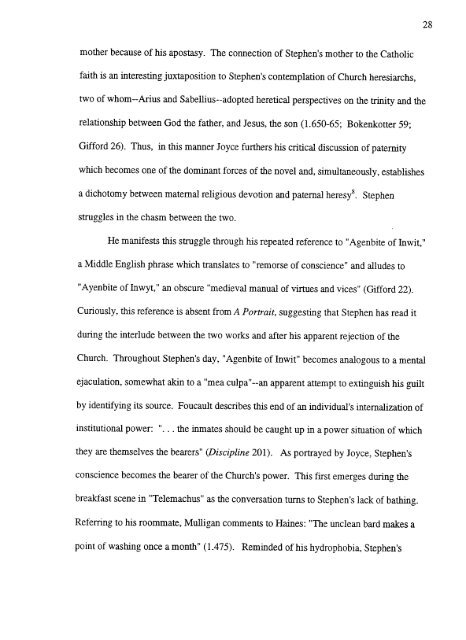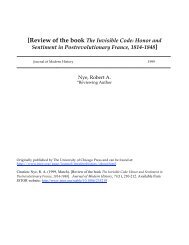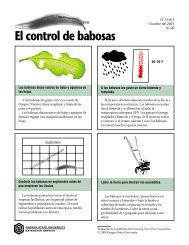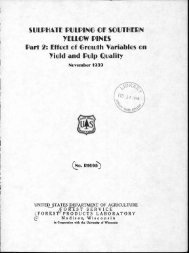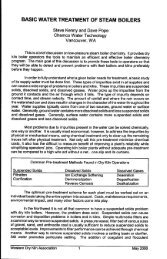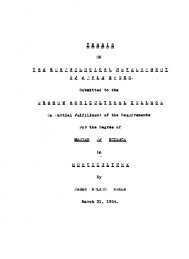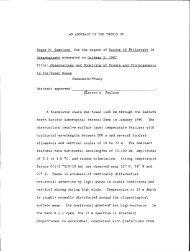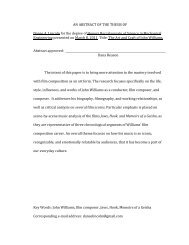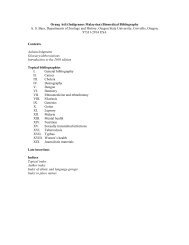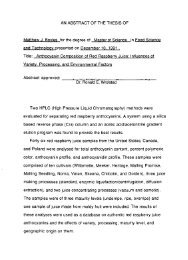Faubourg Saint Patrice - ScholarsArchive at Oregon State University
Faubourg Saint Patrice - ScholarsArchive at Oregon State University
Faubourg Saint Patrice - ScholarsArchive at Oregon State University
Create successful ePaper yourself
Turn your PDF publications into a flip-book with our unique Google optimized e-Paper software.
mother because of his apostasy. The connection of Stephen's motherto the C<strong>at</strong>holic<br />
faith is an interesting juxtaposition to Stephen's contempl<strong>at</strong>ion of Church heresiarchs,<br />
two of whom--Arius and Sabellius--adopted heretical perspectives on the trinity and the<br />
rel<strong>at</strong>ionship between God the f<strong>at</strong>her, and Jesus, the son (1.650-65; Bokenkotter 59;<br />
Gifford 26). Thus, in this manner Joyce furthers his critical discussion of p<strong>at</strong>ernity<br />
which becomes one of the dominant forces of the novel and, simultaneously, establishes<br />
a dichotomy between m<strong>at</strong>ernal religious devotion and p<strong>at</strong>ernal heresys. Stephen<br />
struggles in the chasm between the two.<br />
He manifests this struggle through his repe<strong>at</strong>ed reference to "Agenbite of Inwit,"<br />
a Middle English phrase which transl<strong>at</strong>es to "remorse of conscience" and alludes to<br />
"Ayenbite of Inwyt," an obscure "medieval manual of virtues and vices" (Gifford 22).<br />
Curiously, this reference is absent from A Portrait, suggesting th<strong>at</strong> Stephen has read it<br />
during the interlude between the two works and after his apparent rejection of the<br />
Church. Throughout Stephen's day, "Agenbite of Inwit" becomes analogous to a mental<br />
ejacul<strong>at</strong>ion, somewh<strong>at</strong> akin to a "mea culpa"--an apparent <strong>at</strong>tempt to extinguish his guilt<br />
by identifying its source. Foucault describes this end of an individual's internaliz<strong>at</strong>ion of<br />
institutional power: ". . . the inm<strong>at</strong>es should be caught up in a power situ<strong>at</strong>ion of which<br />
they are themselves the bearers" (Discipline 201). As portrayed by Joyce, Stephen's<br />
conscience becomes the bearer of the Church's power. This first emerges during the<br />
breakfast scene in "Telemachus" as the convers<strong>at</strong>ion turns to Stephen's lack of b<strong>at</strong>hing.<br />
Referring to his roomm<strong>at</strong>e, Mulligan comments to Haines: "The unclean bard makes a<br />
point of washing once a month" (1.475). Reminded of his hydrophobia, Stephen's<br />
28


